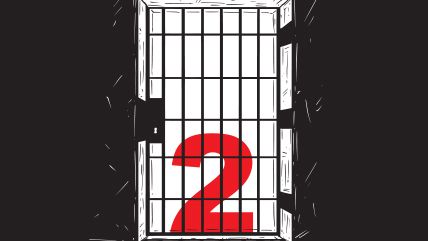Congress Passed the FIRST STEP Act. What's the Second Step?

In the waning days of the 115th Congress, the first major criminal justice bill in eight years was passed. The FIRST STEP Act was both a modest achievement in terms of the bill's scope and a monumental victory merely because Congress did something. But what does the legislation that President Donald Trump signed actually say?
- It requires the Bureau of Prisons to house inmates within 500 driving miles of their home when possible. Regular contact with family can be a significant factor in reducing recidivism among inmates, but families often have to travel long distances at great expense to see incarcerated loved ones.
- It increases the amount of "good time" credits inmates can earn toward their release by avoiding disciplinary infractions, to a maximum of 54 days a year.
- It increases the amount of "earned time" credit inmates can amass by participating in job training and rehabilitative programs. The credits count toward early release to a halfway house or home confinement.
- It bans the shackling of pregnant female inmates. The Bureau of Prisons amended its policies in 2008 to forbid the practice, but there was no federal law against it. It's already illegal in most states, although incarcerated women still report being shackled while in labor, even where it's supposedly outlawed.
The FIRST STEP Act also made four changes to federal mandatory minimum sentencing laws—the first major reductions since the Fair Sentencing Act of 2010, which shrank the notorious sentencing disparity between crack cocaine and powder cocaine offenses.
- It reduces the mandatory minimum sentences for repeat drug offenders under a draconian "three strikes" law. A third drug offense will now carry 25 years in federal prison rather than life. A second drug offense will be punishable by 15 years. Both state and federal felony drug offenses qualify a defendant for the enhancement.
- It eliminates a provision that allowed gun charges to be "stacked" against drug offenders, which prosecutors have, in the past, used to add decades to sentences.
- It expands judges' discretion under the so-called "safety valve" to depart from federal mandatory minimum sentencing laws for certain low-level offenders.
- It makes the reductions to crack cocaine sentences under the Fair Sentencing Act apply retroactively. This will result in reduced sentences for approximately 3,000 crack cocaine offenders currently in federal prison.
Critics said the bill didn't go far enough. To placate law enforcement groups, for example, Congress retro-actively applied only one of the sentencing reforms. Despite caterwauling from Sen. Tom Cotton (R–Ark.) that it amounted to a "jailbreak" for dangerous criminals, the law leaves the federal architecture of mass incarceration largely in place.
But as its name implies, the FIRST STEP Act is intended as a stepping stone to larger reforms. Implementation was held up by the partial federal government shutdown that began just before Christmas and by small drafting errors in the bill's language, but it has already led to some injustices being corrected.
In early January, Matthew Charles was rereleased from federal prison under the retroactive sentencing reductions for crack cocaine offenses in the FIRST STEP Act. Charles' case drew national attention last year after he was sent back to prison following two years of freedom because of a sentencing error.
Charles was first released early in 2016, having served 21 years of a 35-year sentence for selling crack to a police informant. Although he had a serious criminal record prior to his sentencing, Charles was a model inmate who managed to put his life back together on the outside. Yet a federal appeals court ruled that, under the letter of the law, Charles should never have been released. In May 2018, he was reincarcerated.
Criminal justice advocates say Charles is the first person to have his sentence reduced under the new provisions of the FIRST STEP Act. The problem is that many more like him are still behind bars.
As the U.S. government admitted in a filing opposing Charles' first release (after he'd already been freed), the only difference between him and hundreds of other "career offenders" who show evidence of rehabilitation "is that the vast majority of these individuals are still incarcerated while Mr. Charles was released from prison and, thus, had the opportunity to interact with society outside of prison."
Congress should eliminate mandatory sentences like the one that kept Charles incarcerated, and it should continue to empty prisons of people like him.
This article originally appeared in print under the headline "Congress Passed the FIRST STEP Act. What's the Second Step?."


Show Comments (33)